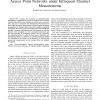Free Online Productivity Tools
i2Speak
i2Symbol
i2OCR
iTex2Img
iWeb2Print
iWeb2Shot
i2Type
iPdf2Split
iPdf2Merge
i2Bopomofo
i2Arabic
i2Style
i2Image
i2PDF
iLatex2Rtf
Sci2ools
116
click to vote
INFOCOM
2007
IEEE
2007
IEEE
Throughput-Optimal Scheduling in Multichannel Access Point Networks Under Infrequent Channel Measurements
—We consider the problem of uplink/downlink scheduling in a multichannel wireless access point network where channel states differ across channels as well as users, vary with time, and can be measured only infrequently. We demonstrate that, unlike infrequent measurement of queue lengths, infrequent measurement of channel states reduce the maximum attainable throughput. We then prove that in frequency division multiplexed systems, a dynamic scheduling policy that depends on both the channel rates (averaged over the measurement interval) and the queue lengths, is throughput optimal. We also generalize the scheduling policy to solve the joint power allocation and scheduling problem. In addition, we provide simulation studies that demonstrate the impact of the frequency of channel and queue state measurements on the average delay and attained throughput.
| Added | 03 Jun 2010 |
| Updated | 03 Jun 2010 |
| Type | Conference |
| Year | 2007 |
| Where | INFOCOM |
| Authors | Koushik Kar, Xiang Luo, Saswati Sarkar |
Comments (0)

